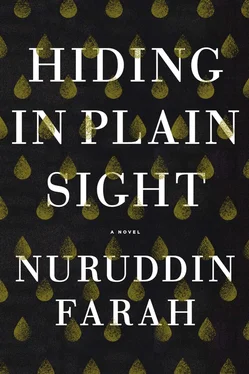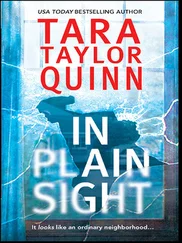Bella does as she is told, wondering whether the receptionists have been rehearsing these speeches the entire time she has been standing in the queue. Immaculata, she muses, what a name.
—
Bella follows Immaculata, high heels clicking, tight miniskirt hugging her knees and high bum, into the elevator and down the hall. She remembers wearing and loving miniskirts as a long-legged young girl in the Somalia of her day, but alas no longer. Not only because a woman her age isn’t expected to show off her wares, but also because Somalia has fallen victim to the terrorizing dictates of religionist renegades, and her beloved Mogadiscio is no longer a cosmopolitan city. Lately, “secularist,” once a term of approbation, has become a dirty word. Somali society has taken a giant step backward, not only as a consequence of the long-running civil war but also because it lags far behind most other countries in education and the other parameters that measure social progress.
“Are you a good Catholic girl?” Bella asks Immaculata.
“I never miss Sunday mass,” the younger woman answers, but something about her expression encourages Bella to say, “I suppose you are regular about your weekly confessions as well?”
“Are you Catholic?” Immaculata asks. Now that they are walking side by side, Bella can see that Immaculata is heavier than she thought and that her skin is not very good. Her hair has been lengthened with extensions, which don’t seem to agree with the dryness of the air-conditioning.
“I was brought up a Muslim,” Bella says.
“I wouldn’t have thought so, looking at you. You’re not wearing body armor.”
Bella thinks that such exchanges are getting boring, and she is tired of explaining. But Immaculata persists.
“Where were you born and brought up, really?” she asks.
“Mogadiscio, Somalia,” Bella says.
“You are teasing me.”
“I am not.”
Immaculata says, “We have Somalis everywhere in our country, millions of them in refugee camps, and they’ve also taken over parts of our country. Have you been to Eastleigh? You don’t look like them — you have beautiful skin, too light for a Somali. Nor do you carry yourself like them, walk like them, or behave like them.”
“How do they behave?” Bella says.
“They are full of themselves, madam,” says Immaculata.
Bella does not wish to get into an argument with anyone, here above all, but it disturbs her to let a half-truth go uncorrected. Kenyan Somalis, who account for nearly six percent of this country’s population, have remained third-class citizens here, disenfranchised and marginalized. If they behave badly, that is undoubtedly in part a result of their poor treatment by other Kenyans. But the refugees in the camps are recent arrivals from Somalia, driven out by the collapse of their government. But what is the point of trying to correct this woman?
“Guns, lawlessness, and daily murders of their kith and kin, you name it,” Immaculata says. “They’ve brought guns into our country across the border. They bomb our churches and they bomb their mosques. But of course, you are not like them. And I’m told that Aar, your brother, was such a gentle soul.”
“He was,” says Bella.
“Thankfully, there are several battalions of the Kenyan Defense Force currently stationed in Somalia to bring order to your country,” Immaculata says.
At this, Bella has to respond. “Have you ever had occasion to meet or speak to a Somali other than me?” she asks.
“Never,” Immaculata says.
“Why not?”
“They’re too arrogant to talk to the likes of me, a tea girl,” Immaculata says.
She stops before a closed door, on which she taps. They wait, and then a woman’s voice says, “Come in.” Immaculata steps aside deferentially and Bella hesitates, then goes in.
A well-built woman of Viking stock, big boned and blue-eyed, gets to her feet, smiling. She waits with her hand extended while Bella makes her way around a huge escritoire. Gunilla Johansson’s grip is firm, her self-confidence immense. There are elements of generosity and joy on her face as she and Bella shake hands, then hug and let go. “Welcome,” she says.
The desk is cleared of everything but a couple of files. Bella wonders if it is always this way or if Gunilla has prepared it so for this encounter. Were the circumstances different, she would describe the encounter as a joy, she senses — but tragedy has removed such a word from her current vocabulary. And it would be in her character to be a lot warmer to Gunilla as her potential in-law, which, sadly, did not come to be.
“Thanks for making the time to see me,” Bella says. “And before I forget it, I must thank you for the help you’ve provided in having Valerie and Padmini released from their lockup in Uganda. I very much appreciate your sense of discretion in such a delicate matter. Thanks to you, Valerie and Padmini are now in Nairobi, but they are none the wiser about your invaluable contribution. All because of your friendship with Aar, who was most dear to us all.”
At that, Gunilla’s eyes well with emotion. She takes half a step back, saying, “Sorry,” then reaches for the box of tissues. She pulls out a couple and then touches them gently to just below her eyes, blotting carefully so that her makeup remains unaffected. Bella can’t help thinking that Gunilla has practiced this move countless times — maybe with Aar nearby, watching, overseeing.
Gunilla says, “We’ll miss him. I loved him.”
What Bella suspected has become obvious. She remembers back to that last time in Istanbul with Aar — his aura of happiness, the two necklaces he purchased — one for her and the identical one, she thought then, for Dahaba, but now she knows for sure. He behaved like a teenager with a secret to treasure, and now she knows what it was.
Immaculata is still standing in the half-open doorway. She wants to know if either of them would like tea, coffee, or water.
“Coffee, Immaculata, and thanks,” Bella says.
Gunilla says, “Same for me and some water too.”
Gunilla closes the door behind the tea girl for privacy. An instant of indecision wrinkles her brow, and then her features relax.
Bella knows that as one of the most senior of the UN staff here Gunilla would be privy to a great deal of what goes on in the upper-level bureaucracy. But it is of private matters that Gunilla now speaks. “I believe I was the last person he spoke to,” she says. “He rang me from his apartment complex to confirm that he would be on the UN OCHA flight, and we agreed that I would pick him up and that he would spend the night at my place. This was not always the case. Often his driver would fetch him and then he would come straight to the office or go home and report for duty the following day.”
“What did he sound like when he called?” Bella asks.
“On edge.”
“What was the reason?”
Gunilla tells her about the death threat and the visit from the security team, and Aar’s suspicions and subsequent change of plans.
“Why did he make that detour to his office?” asks Bella.
“I don’t know,” Gunilla says. “Maybe he felt he was a marked man. He knew he would be asking for a transfer to Nairobi immediately after he flew back. Knowing he wouldn’t be back, maybe he wanted to get his things.”
While Gunilla rummages through a filing cabinet, Bella hears some humming in her ears. The humming goes on long enough to worry her. And then she has a momentary headache, her vision blurs. When the humming clears and she can see better, she starts to pay attention to what Gunilla is saying to her.
Gunilla apologizes. “I’m sorry,” she says, “but I need to have you fill in some forms. Are you up to it? I can help you, if you like. That way it will be quicker.”
Читать дальше












